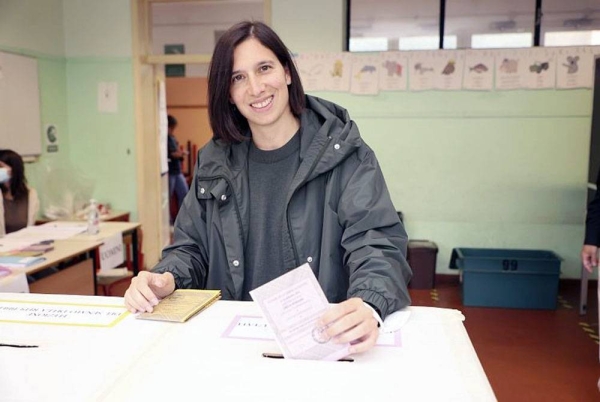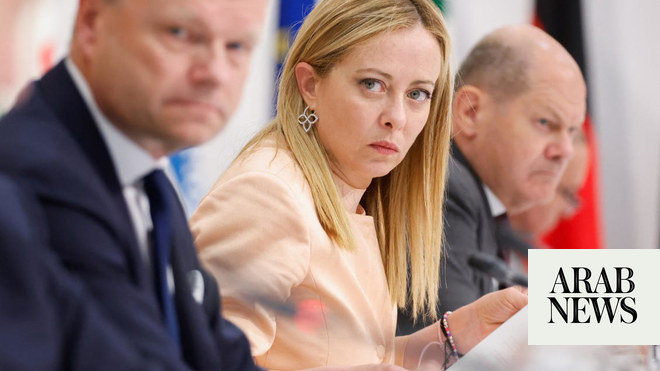
ROME — Italy’s center-left Democratic Party (PD) has selected Elly Schlein as its new leader.
The 37-year-old MP has emerged as a breakout start in Italian politics, and will hope her elevation to party leader will bring a ray of hope for the beleaguered center-left, which suffered a devastating defeat in the September general elections, which saw Brothers of Italy’s Giorgia Meloni and her right-wing alliance sweep into power with a landslide victory.
Italian-American Schlein was born in Switzerland and holds triple nationality. She is young, a feminist and impassioned pro-European who posits herself as a “real” leftist — one who appeals to society’s most disenfranchised, rather than the “elites” the modern-day left is often accused of courting.
Media outlets have described Schlein as the “anti-Giorgia Meloni”, and compared her to US Representative Alexandria Ocasio-Cortez, who is also renowned for her socially progressive platform.
So who is Elly Schlein? Will she be able to revive Italy’s moribund center-left? And how do Italians perceive her?
Elly Schlein’s political position is perhaps best encapsulated by the way in which she announced her leadership bid last year.
Speaking at a club in Rome’s suburbs — outside of its “limited traffic zone,” a metaphor often used to depict the urban elite — she announced a “progressive, environmentalist and feminist” campaign to offer an “alternative” to Italy’s new far-right government. All the while, her supporters sang “Bella Ciao” — Italy’s anti-fascist Resistance anthem.
Schlein, who belongs to the PD’s more socialist wing, aims to present a fresh and unifying vision for the left and the country.
As a party whose roots lie in a fusion between the Communist and Christian Democratic factions of Italy’s past, the PD is often perceived as suffering from an identity crisis, floundering through a divide between a more centrist, economically liberal wing and leftist one.
The party’s past leaders, especially Matteo Renzi, have often been accused of eschewing the PD’s leftist roots, and indeed her leading opponent in the primaries, Stefano Bonaccini, occupies a politically centrist ground, despite having formerly been a Communist Party member.
Schlein, for instance, supports a minimum wage — a proposal that the Democratic Party has endorsed but failed to push through while in government. She speaks about a Green New Deal and bringing the party back to the trade unions and city outskirts, all of which have drawn comparisons to the platform of Alexandria Ocasio-Cortez.
Schlein’s reputation for being a gutsy conviction politician breaking through the ranks of Italy’s stuffy political establishment has also led commentators to see her as the left’s answer to fresh-faced PM Giorgia Meloni, whose own meteoric rise from the margins of Italian politics was attributed to her charismatic persona and mass appeal.
While Schlein resists the anti-Meloni label, she has certainly not pulled the punches on Italy’s new — and first female — premier.
“Not all female leaderships are feminist leaderships,” she said in December. “Politically, we’re poles apart.”
Italy’s political class has garnered a reputation for homogeneity — throughout the decades, its members have been overwhelmingly male and advanced in age.
Schlein’s background stands in obvious contrast, not only for her gender and youth but for her heritage as well.
Born in Switzerland, the leftist politician hails from an ethnically diverse family. Schlein’s father is a Jewish American political scientist, her mother an Italian law professor, and she consequently holds triple Swiss-Italian-US citizenship.
If elected as head of the Democratic Party, Schlein would become both the first woman and openly LGBTQ person to lead the center-left bloc.
Schlein makes no secret of how her background makes her something of an outlier in Italian politics. Back in 2020, she came out as bisexual on a popular television show, announcing that she had a girlfriend.
As a triple citizenship holder, it comes as little surprise that Schlein’s career would be as international as her background.
Following the completion of a law degree from the University of Bologna, the leftist politician started her career 7,000 km from home by working on Barack Obama’s campaign trails in 2008 and 2012.
After cutting her political teeth across the Atlantic, Schlein became an impassioned youth activist for the Democratic Party and was elected as a member of the European Parliament in 2014.
Come the following year, and increasingly opposed to the labor reforms of the then-PM and party leader, Renzi, she ultimately parted ways with the PD and joined a splinter party, Possible (Possibile).
In 2020, Elly Schlein was elected on a center-left ticket in Emilia-Romagna, a historically communist region that risked succumbing to Matteo Salvini’s anti-immigrant, populist Northern League in the regional elections.
She emerged as the single most successful candidate in the region’s history, becoming regional vice-president — the current President, Bonaccini, is her opponent in next year’s primaries — and effectively halted a supposedly “unbeatable” far-right wave.
On how she managed to beat Salvini? “By asking the right questions,” she quipped.
The media buzz surrounding Elly Schlein is such that the young candidate is already being heralded the new protagonist of Italy’s left. But when one scratches beneath the surface, is she as popular as she is made out to be?
At one point in the leadership campaign, Schlein was 18 points behind her main opponent, but remained a popular choice among PD’s leftist youth, many of whom are pinning their hopes on her to revive the party and its values.
“A regeneration of the party is necessary,” one PD member, Laura Leuzzi, told Euronews. “I think [Schlein] can bring about this renewal and I always try to support leftist female leadership that pays attention to younger generations.”
For many Italian leftists, who, like Schlein, had ditched the PD as a result of its increasingly centrist positions over the past decade — especially following Matteo Renzi’s leadership of the party — the aspiring candidate remains a welcome potential change.
Among these is Giacomo, 29, who left the party after disagreeing with its political line. He told Euronews he would vote for her in the primaries. “
“Unlike what her detractors say, she brings forward many more ideas than people give her credit for.”
“As an MEP, for instance, she tried to reform the Dublin Convention on asylum seekers, while the PD was attacking the legal rights of migrants,” he noted.
But other young leftists are less impressed. Among these is Agostino Biondo, a 30-year-old Rome-based warehouseman and youth activist for the PD. Despite being on the party’s leftist wing, he is not convinced that Schlein’s policies are sufficiently socialist.
“[Saying you’re a leftist] is not enough,” he told Euronews. “What does it mean to be a leftist?”
“Being in favor of a minimum salary is not leftist enough... you need to be in favor of the nationalization of the means of production at least, and even that isn’t enough.”
Over the past years, the PD has suffered from stagnancy and is seen as having abandoned the working class, leaving members like Biondo skeptical that she can bring about any major changes.
“The PD needs to intercept workers, the unemployed, people who probably don’t even know who Elly Schlein is,” he said.
“Yes, she talks about wanting to venture outside of the city center, but so have other PD candidates in the past... The problem is, how are you going to go about doing it?” — Euronews












